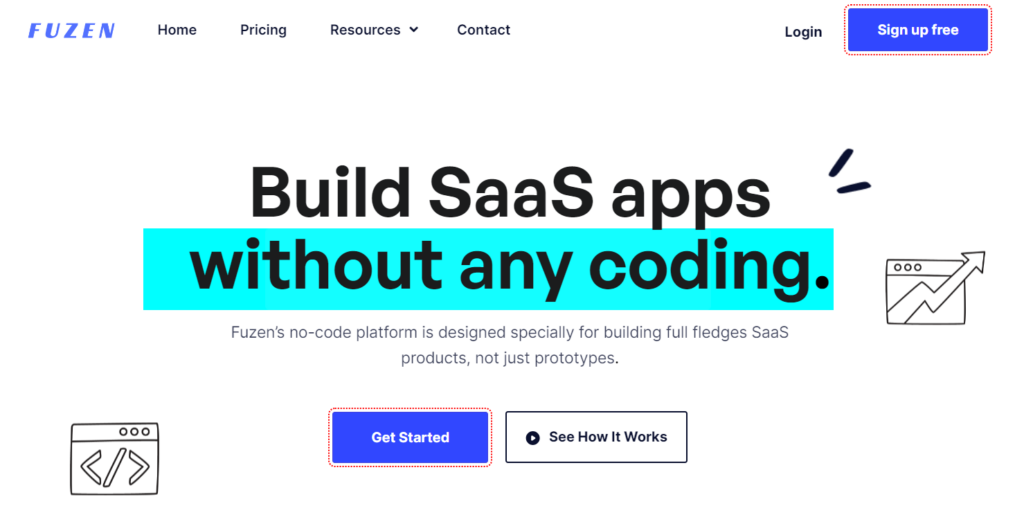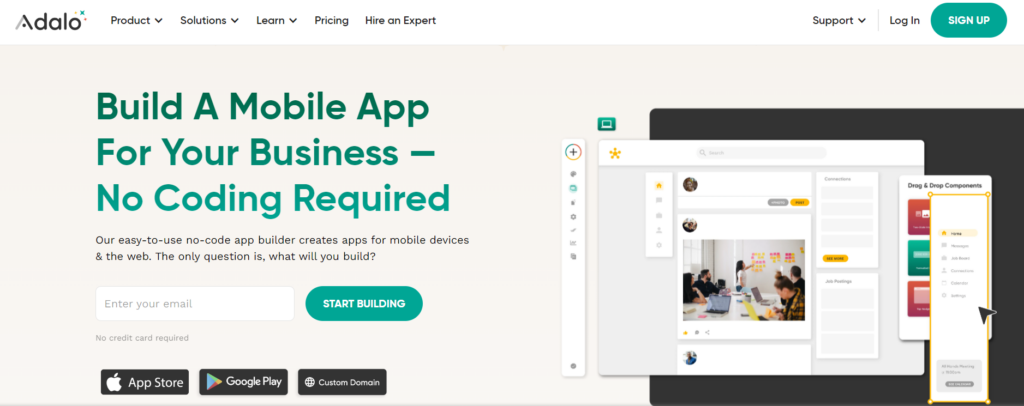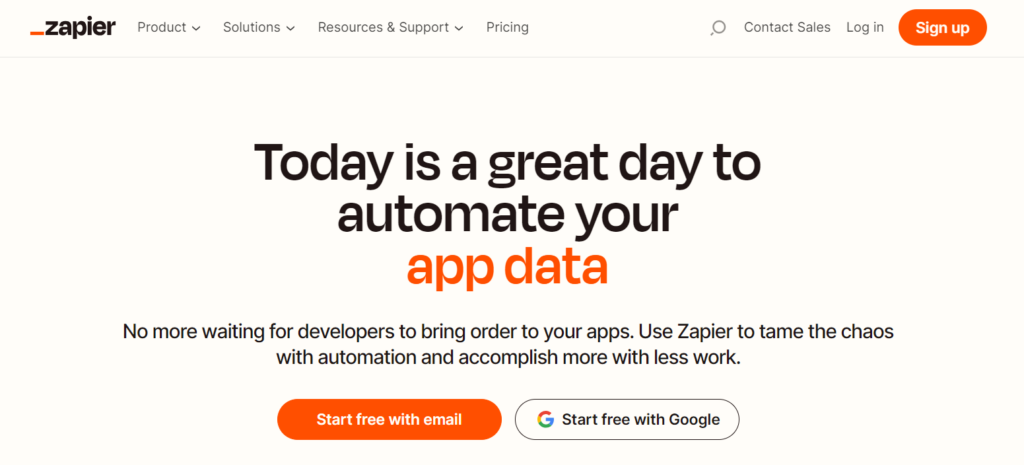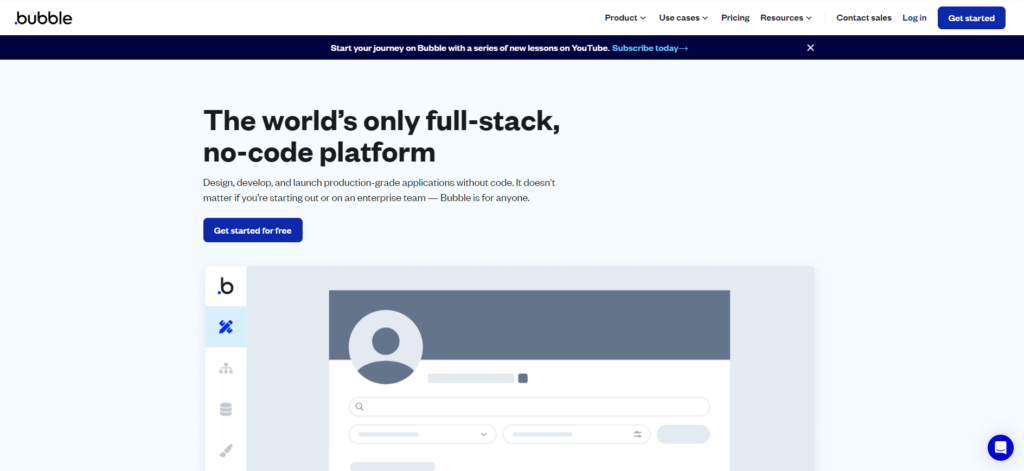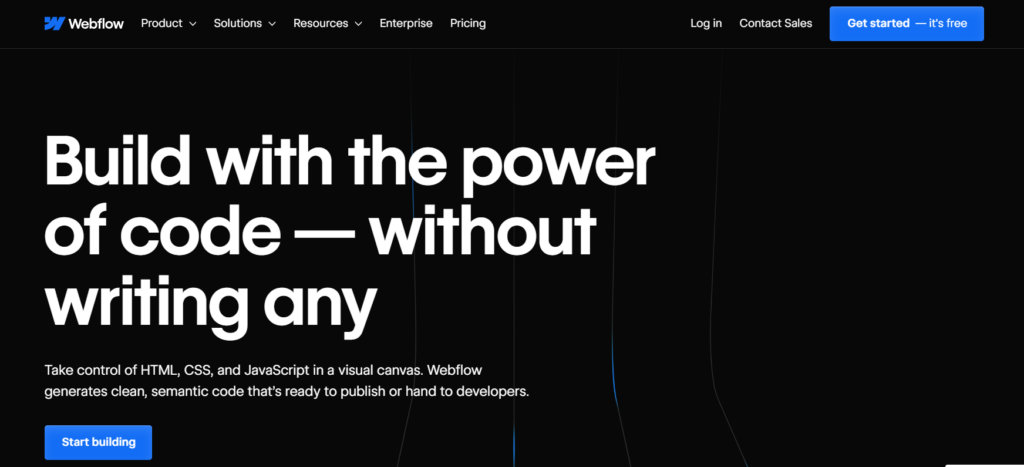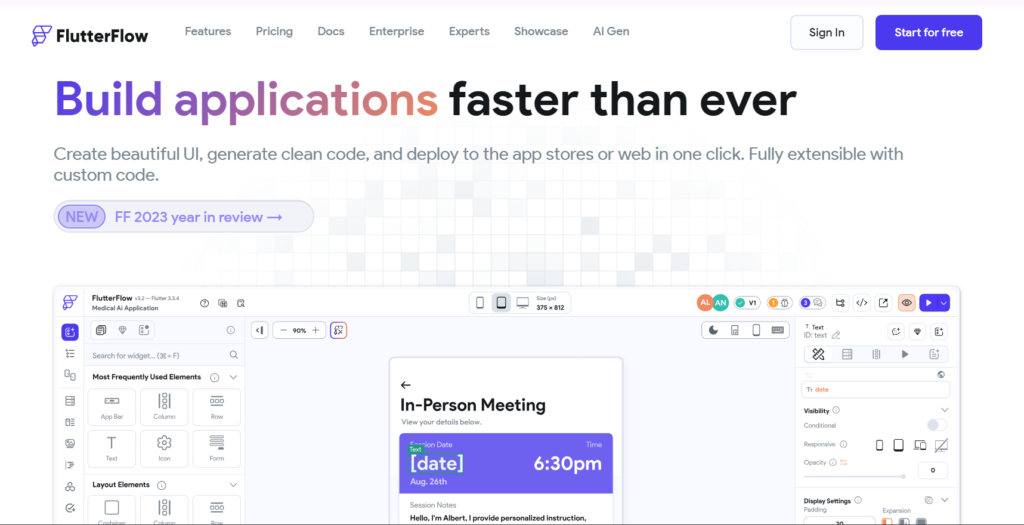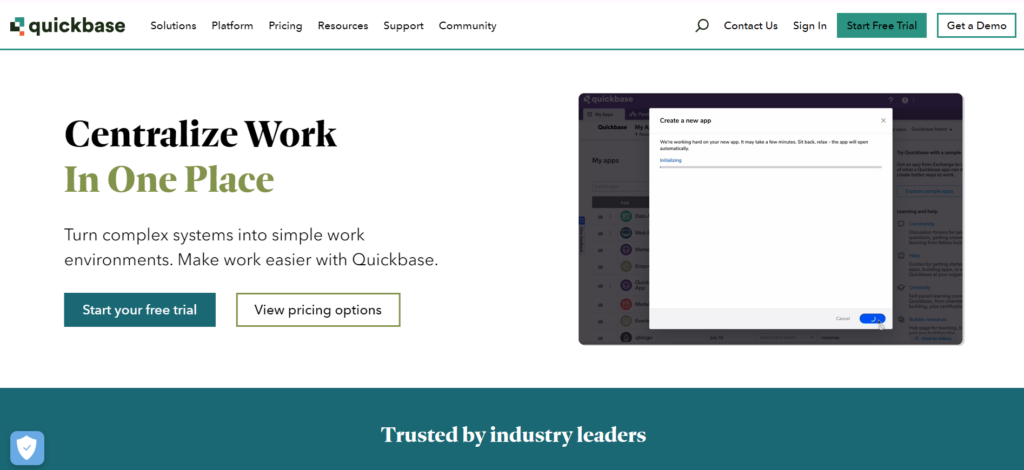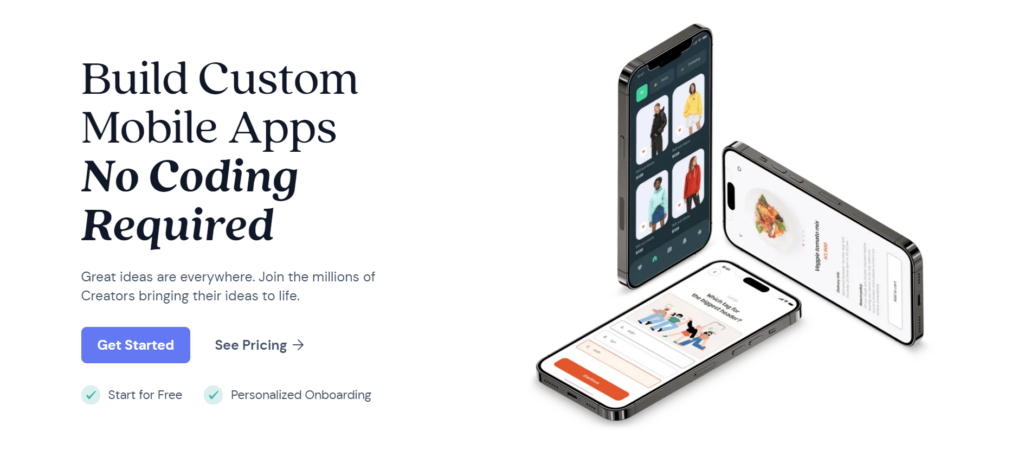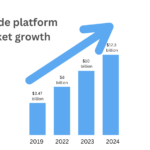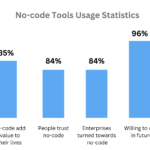Much like the e-commerce explosion of the past, 2024 marks a significant shift towards embracing AI-driven solutions. Businesses are increasingly turning to Generative AI Apps to optimize their processes and enhance productivity.
In fact, Exploding Topics mentions that more than 50% of companies are planning to incorporate AI technologies in 2024.
So, there's no better time than this to build an AI application. And the best part is, you don’t even need to be a coding expert now.
Thanks to the rise of no-code platforms, creating AI applications has become more accessible and easier than ever before.
In this blog post, we'll guide you through some of the best no-code platforms in 2024 that will allow you to create stunning applications.
Best no code platforms in 2024
1. Fuzen
Fuzen combines the no-code ability with Generative AI for SaaS application development, providing a robust suite of tools tailored specifically for this niche. With Fuzen, users can effortlessly create, test, and deploy SaaS applications without the need for extensive coding knowledge. Its intuitive interface and seamless integrations make it a top choice for entrepreneurs and businesses venturing into the realm of subscription-based software.
Pros
- It offers a wide range of pre-built templates and tools, which means you can get started on your app quickly without having to build everything from scratch.
- Highly scalable, meaning that as your business grows and you need your app to handle more users and data, Fuzen can handle it without any problems.
- Very flexible, allowing you to customize your app to fit your specific needs and preferences. Whether you need to add new features or change how existing ones work, Fuzen makes it easy.
- With its intuitive interface, Fuzen makes app development accessible to everyone, regardless of their coding experience.
- Seamless integration capabilities allow for the incorporation of AI-driven features, enhancing the functionality and intelligence of applications.
Cons
- It is not meant for developing websites, landing pages, or mobile apps.
Ideal for
Businesses seeking to develop scalable and feature-rich SaaS applications without the need for extensive coding expertise.
Price
- Free version: Available.
- Paid version: Starts at $19 per month for basic features and support, with higher-tier plans available for additional features and support options.
G2 Rating: 4.5/5
2. Adalo
Adalo sets the standard for mobile app development, offering a comprehensive platform that empowers users to design and deploy stunning mobile applications with ease. From sleek user interfaces to seamless database integration, Adalo provides the tools necessary to bring your mobile app ideas to life, catering to the needs of designers, freelancers, and small businesses alike.
Pros
- Specializing in mobile app development, Adalo offers a user-friendly platform equipped with customizable templates and pre-built components.
- Robust design capabilities empower users to create visually stunning and responsive mobile applications tailored to their unique requirements.
- Seamless integration with third-party services facilitates the incorporation of advanced functionalities such as location-based services and push notifications.
Cons
- Limited scope for highly complex applications that may require extensive customization beyond the platform's capabilities.
- Occasional performance issues may arise when handling large-scale projects with intricate features.
Ideal for
Entrepreneurs and startups aiming to rapidly prototype and launch mobile applications for iOS and Android platforms.
Price
- Free version: Available
- Paid version: Starts at $36 per month for individuals and small businesses, with higher-tier plans available for larger organizations.
G2 Rating: 4.6/5
3. Zapier
Zapier stands as the epitome of automation, serving as the ultimate bridge between disparate apps and workflows. With its vast array of integrations and intuitive workflow builder, Zapier enables users to automate repetitive tasks and streamline processes without writing a single line of code. From simple triggers to complex multi-step automation, Zapier empowers individuals and businesses to maximize productivity and efficiency.
Pros
- Renowned for its automation capabilities, Zapier enables users to streamline workflows and automate repetitive tasks across a multitude of applications.
- Intuitive 'no-code' workflow builder empowers users to create complex automation sequences without writing a single line of code.
- An extensive library of integrations spanning various software services offers unparalleled flexibility in automating diverse business processes.
Cons
- Dependency on third-party integrations may result in occasional compatibility issues or limitations in functionality.
- Advanced automation workflows may require a deep understanding of the platform's capabilities and integration nuances.
Ideal for
Businesses seeking to enhance operational efficiency by automating routine tasks and integrating disparate software systems seamlessly.
Price
- Free version: Available
- Paid version: Starts at $19 per month for individuals and small businesses, with pricing based on the number of tasks and integrations needed.
G2 Rating: 4.7/5
4. Bubble
Bubble shines as a beacon for building complex web applications, offering a visual programming interface that unlocks limitless possibilities. With Bubble, users can create feature-rich applications with advanced functionalities, all without the need for traditional coding. Its highly customizable nature and extensive plugin ecosystem make it a preferred choice for entrepreneurs and developers tackling intricate projects.
Pros
- Renowned for its versatility, Bubble empowers users to develop complex web applications with dynamic functionalities without writing code.
- Extensive range of customizable elements and plugins facilitates the creation of highly tailored and feature-rich web applications.
- Powerful backend workflows enable the implementation of complex business logic and data processing without compromising performance.
Cons
- Steeper learning curve compared to other no-code platforms, particularly for mastering advanced features and workflows.
- Limited scalability for extremely high-traffic applications may necessitate migration to alternative solutions in the long term.
Ideal for
Entrepreneurs and businesses embarking on ambitious web application projects that demand advanced functionalities and customizability.
Price
- Free version: Available
- Paid version: Starts at $29 per month for individuals and small businesses, with higher-tier plans offering more features and support.
G2 Rating: 4.4/5
5. Webflow
Webflow redefines website design, providing a powerful platform that combines the ease of visual design with the flexibility of custom code. With Webflow, users can create visually stunning websites that are fully responsive and pixel-perfect. From portfolio sites to e-commerce stores, Webflow offers the tools necessary to bring your web design visions to life, catering to designers, agencies, and businesses alike.
Pros
- Equipped with an intuitive visual editor and responsive design tools, Webflow empowers users to create professional-grade websites with pixel-perfect precision.
- Comprehensive hosting and CMS capabilities streamline the website development process, eliminating the need for third-party services.
- Seamless integration with e-commerce platforms facilitates the creation of robust online stores with secure payment gateways and inventory management.
Cons
- Relatively limited scope for highly complex websites requiring extensive backend customization or integration with proprietary systems.
- Pricing structure may be prohibitive for budget-conscious users or small-scale projects.
Ideal for
Designers, freelancers, and small businesses seeking to create visually stunning and functional websites without the need for coding expertise.
Price
- Free version: Available
- Paid version: Starts at $14 per month for individuals and small businesses, with higher-tier plans offering more features and support.
G2 Rating: 4.6/5
6. Flutterflow
Flutterflow emerges as a game-changer in the realm of mobile app development, leveraging the power of Google's Flutter framework. With Flutterflow, users can design and deploy cross-platform mobile applications with unparalleled ease and efficiency. Its intuitive interface and seamless integration with Flutter's ecosystem make it a top choice for developers looking to create high-performance mobile experiences.
Pros
- Built on Google's Flutter framework, Flutterflow provides a powerful platform for developing cross-platform mobile applications with native-like performance.
- Intuitive visual editor and widget-based interface enable users to design and customize app layouts effortlessly, catering to diverse design preferences.
- Seamless integration with Firebase backend services offers robust authentication, database management, and cloud storage capabilities, empowering developers to build feature-rich applications.
Cons
- Limited availability of pre-built components and templates compared to other platforms may require additional design and development effort for certain functionalities.
- Relatively new platform may lack the extensive community support and resources available for more established frameworks.
Ideal for
Developers and businesses seeking to leverage the performance benefits of Flutter for building high-quality mobile applications across multiple platforms.
Price
- Free version: Available with basic features and usage limits.
- Paid version: Starts at $20 per month for individuals and small businesses, with higher-tier plans offering additional features and support.
G2 Rating: 4.7/5
7. Quickbase
Quickbase empowers businesses to build custom applications tailored to their unique needs, without the need for extensive coding or development resources. With its drag-and-drop interface and powerful integrations, Quickbase enables users to streamline processes, automate workflows, and drive operational efficiency across the organization. From project management to CRM, Quickbase offers a versatile platform for building robust business applications.
Pros
- Quickbase offers a comprehensive low-code platform for developing custom business applications tailored to specific workflow and process requirements.
- Intuitive visual interface and drag-and-drop functionality enable users to create and modify applications without the need for extensive coding knowledge.
- Robust integrations with popular business software systems facilitate seamless data exchange and automation, enhancing productivity and efficiency.
Cons
- Pricing structure may be prohibitive for small businesses or startups with limited budgets, particularly for scaling applications and users.
- Customization options may be constrained by platform limitations, requiring workarounds or compromises for highly specialized requirements.
Ideal for
Enterprises and mid-sized businesses seeking to streamline internal processes, manage data effectively, and accelerate digital transformation initiatives.
Price
- Free version: Not available.
- Paid version: Pricing varies depending on the number of users and features required, typically starting at $500 per month for small teams.
G2 Rating: 4.4/5
8. Thunkable
Thunkable simplifies the process of mobile app prototyping, providing a user-friendly platform for designing and testing app ideas. With Thunkable, users can create interactive prototypes and gather feedback from stakeholders before diving into full-scale development. Its intuitive interface and extensive library of pre-built components make it a valuable tool for designers, entrepreneurs, and product managers looking to validate their app concepts.
Pros
- Thunkable provides a user-friendly platform for building mobile applications for iOS and Android devices, utilizing a visual drag-and-drop interface.
- Extensive library of pre-built components and templates facilitates rapid prototyping and development of mobile apps without the need for coding expertise.
- Seamless integration with popular APIs and third-party services enables the incorporation of advanced functionalities such as location services, notifications, and in-app purchases.
Cons
- Limited flexibility for complex app requirements may necessitate custom code extensions or workaround solutions, particularly for highly specialized functionalities.
- Platform-specific limitations and performance issues may arise when developing resource-intensive applications or games.
Ideal for
Entrepreneurs, educators, and hobbyists looking to develop mobile applications quickly and affordably without the overhead of traditional coding.
Price
- Free version: Available
- Paid version: Starts at $13 per month for individuals and small businesses, with higher-tier plans offering additional features and support.
G2 Rating: 4.3/5
Conclusion
Whether you're a budding entrepreneur with a groundbreaking idea or an established business aiming to streamline operations, these platforms offer the tools and flexibility to transform concepts into reality swiftly and cost-effectively.
Choose the one according to your needs and start building your app right away.

